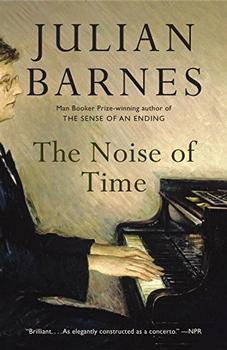Summary | Excerpt | Reading Guide | Reviews | Beyond the Book | Readalikes | Genres & Themes | Author Bio

Critics' Opinion:
Readers' Opinion:
First Published:
May 2016, 224 pages
Paperback:
Jun 2017, 224 pages
 Book Reviewed by:
Book Reviewed by:
Donna Chavez
Buy This Book
1936: he had always been superstitious about leap years. Like many people, he believed that they brought bad luck.
#
Those who did not know him, and who followed music only from a distance, probably imagined that this had been his first setback. That the brilliant nineteen-year-old whose First Symphony was quickly taken up by Bruno Walter, then by Toscanini and Klemperer, had known nothing but a clear, clean decade of success since that premiere in 1926. And such people, perhaps aware that fame often leads to vanity and self-importance, might open their Pravda and agree that composers could easily stray from writing the kind of music people wanted to hear. And further, since all composers were employed by the state, that it was the state's duty, if they offended, to intervene and draw them back into greater harmony with their audience. This sounded entirely reasonable, didn't it?
Except that they had practised sharpening their claws on his soul from the beginning: while he was still at the Conservatoire a group of Leftist fellow students had tried to have him dismissed and his stipend removed. Except that the Russian Association of Proletarian Musicians and similar cultural organisations had campaigned from their inception against what he stood for; or rather, what they thought he stood for. They were determined to break the bourgeois stranglehold on the arts. So workers must be trained to become composers, and all music must be instantly comprehensible and pleasing to the masses. Tchaikovsky was decadent, and the slightest experimentation condemned as "formalism."
Except that as early as 1929 he had been officially denounced, told that his music was "straying from the main road of Soviet art," and sacked from his post at the Choreographic Technical College. Except that in the same year Misha Kvadri, the dedicatee of his First Symphony, became the first of his friends and associates to be arrested and shot.
Except that in 1932, when the Party dissolved the independent organisations and took charge of all cultural matters, this had resulted not in a taming of arrogance, bigotry and ignorance, rather in a systematic concentration of them. And if the plan to take a worker from the coal face and turn him into a composer of symphonies did not exactly come to pass, something of the reverse happened. A composer was expected to increase his output just as a coal miner was, and his music was expected to warm hearts just as a miner's coal warmed bodies. Bureaucrats assessed musical output as they did other categories of output; there were established norms, and deviations from those norms.
#
At Arkhangelsk railway station, opening Pravda with chilled fingers, he had found on page three a headline identifying and condemning deviance: muddle instead of music. He determined at once to return home via Moscow, where he would seek advice. On the train, as the frozen landscape passed, he reread the article for the fifth and sixth times. Initially, he had been shocked as much for his opera as for himself: after such a denunciation, Lady Macbeth of Mtsensk could not possibly continue at the Bolshoi. For the last two years, it had been applauded everywhere—from New York to Cleveland, from Sweden to Argentina. In Moscow and Leningrad, it had pleased not just the public and the critics, but also the political commissars. At the time of the 17th Party Congress its performances had been listed as part of the Moscow district's official output, which aimed to compete with the production quotas of the Donbass coal miners.
All this meant nothing now: his opera was to be put down like a yapping dog which had suddenly displeased its master. He tried to analyse the different elements of the attack as clearheadedly as possible. First, his opera's very success, especially abroad, was turned against it. Only a few months before, Pravda had patriotically reported the work's American premiere at the Metropolitan Opera. Now the same paper knew that Lady Macbeth of Mtsensk had only succeeded outside the Soviet Union because it was "non-political and confusing," and because it "tickled the perverted taste of the bourgeois with its fidgety, neurotic music."
Excerpted from The Noise of Time by Julian Barnes. Copyright © 2016 by Julian Barnes. All rights reserved. No part of this excerpt may be reproduced or reprinted without permission in writing from the publisher.




There is no worse robber than a bad book.
Click Here to find out who said this, as well as discovering other famous literary quotes!
Your guide toexceptional books
BookBrowse seeks out and recommends the best in contemporary fiction and nonfiction—books that not only engage and entertain but also deepen our understanding of ourselves and the world around us.